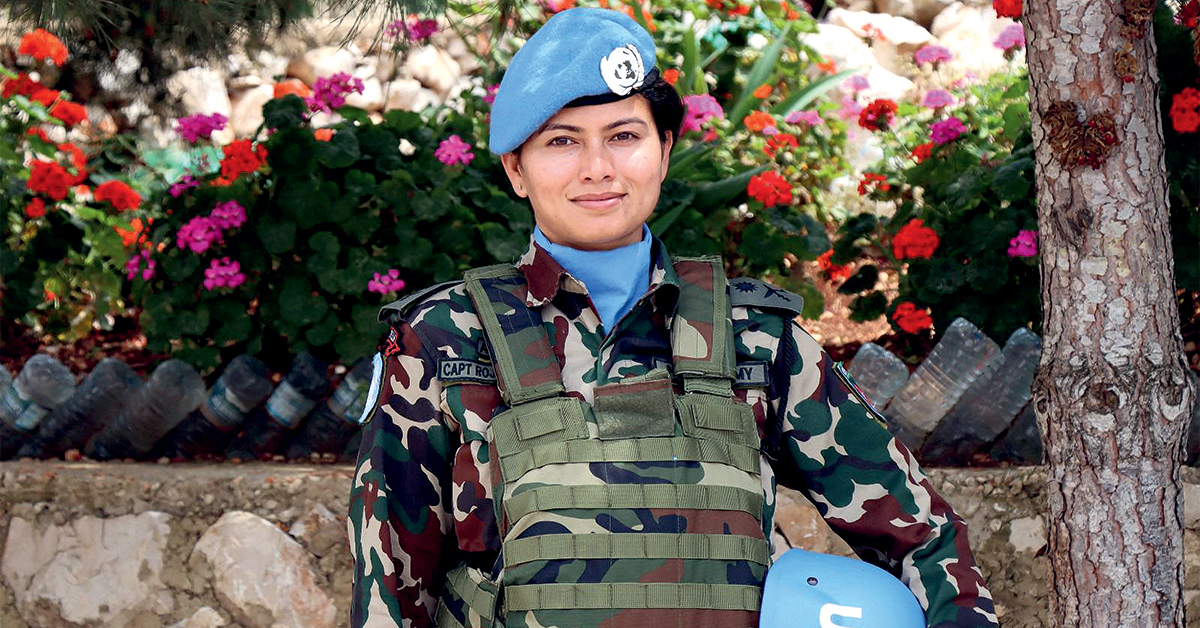
Captain Rojina Mahat of the Nepali Army recently returned home in February after a year-long service in the United Nations Interim Force In Lebanon (UNIFIL). Mahat, one of many women UN peacekeepers working on the security frontlines who worked, was stationed at the ‘sensitive-blue line’ demarcated area between Lebanon and Israel. Along with 850 fellow Nepali peacekeepers, Mahat played a significant role in maintaining stability and preventing further escalation in the geopolitically sensitive area. “We were aware of the situation before being deployed there in February 2024. However, we strictly upheld our responsibility and adhered to the UNIFIL’s mandate, which is to maintain peace,” said Mahat, who joined the Nepali Army nine years ago.
Established by the United Nations on June 7, 2000, the Blue Line serves as a demarcation line drawn to confirm Israel’s withdrawal from Lebanon and the Golan Heights. However, it is, as the name suggests, a temporary line and not an internationally recognized permanent border. The region has remained tense fueled by geopolitical rivalries. Tensions further escalated in the area following the Palestinian armed political group Hamas’ attack on Israel on October 7, 2023, which has led to an ongoing conflict between Israel and Hamas. Consequently, Hezbollah – an armed political group in Lebanon and a Hamas ally – started direct confrontation with the Israel Defense Force (IDF), complicating UNIFIL’s already complex operations.
To minimize the deteriorating security situation at the Blue Line area, the UN has deployed around 10,500 peacekeepers from 50 troop-contributing countries under UNIFIL- a mission authorized by Security Council Resolutions 425 (1978) and 426 (1978). The UNIFIL mandate renewed annually by the Security Council at request from the Lebanon government, aims to facilitate the withdrawal of Israeli forces from southern parts of the country, maintain peace and security, and assist Lebanon to return its effective authority in the area.
Amid ground hostilities and missile attacks between the IDF and Hezbollah, Mahat demonstrated remarkable courage and resilience along with her team. “Before departing for Lebanon, we were trained at Birendra Peace Operation Training Centre (BPOTC) in Panchkhal which prepared us in advance for the realities of the peacekeeping mission,” Mahat shared, adding, “That helped us carry out our duties effectively despite the adverse situations.”
Established in 1986, BPOTC is a renowned training institute run by the Nepali Army dedicated to training peacekeepers for employment in various UN peacekeeping operations.

UN peacekeeping soldiers and observers have been deployed to conflict zones since 1948. Nepal too has been contributing to these peacekeeping missions in conflict-affected countries on call of the UN. Nepali soldiers were deployed as observers in Lebanon for the first time in 1958. Since then, it has consistently been one of the top contributors to peacekeeping missions. Notably, Nepal has held the position as the world’s leading peacekeeping contributor for the past three years.
More importantly, Nepali women peacekeepers are also gradually gaining prominence in these missions. In a journey spanning a half-century covering 44 UN missions, Nepal has thus far deployed 1,54,274 personnel, of which 2883 are women. At present, as many as 5,912 Nepali UN peacekeepers are deployed across 11 missions, of which 643 are women. UN data suggests that Nepal leads in the percentage of women peacekeepers deployed among all contributing nations, with approximately 11% of its contingent being female. Similarly, the data provided by the Nepali Army reveals only 106 Nepali women personnel were deployed for peacekeeping missions during 2017-2018, whereas in 2024-2025, 643 women were stationed across various missions.
Not only do these women contribute to maintaining peace and order, but they play a crucial role in addressing gender-based vulnerabilities in conflict zones.
Earlier stationed in the operations unit of UNIFIL, Mahat later went on to serve as a Gender Focal Officer. She revealed that women in crisis-affected communities of Lebanon face immense challenges. “As part of my duties, I provided direct support to local women from the vulnerable communities. Even during the toughest days, taking shelter in bunkers, our priority remained, we prioritized the women in need,” she said, adding that such responsibilities provided her team with an immense sense of fulfilment.
In 2022, 7.9 percent of military, police, justice and corrections personnel in field missions were women, a marked increase from just 1 per cent in 1993. Women made up 5.9 per cent of military contingents, 14.4 percent of police contingents, and 43 per cent of justice and corrections government-provided personnel in UN Peacekeeping missions. Although the UN continues to advocate strongly with Member States, it is ultimately the latter who are ultimately responsible for deploying uniformed women as part of their contributions.

The UN targets to increase female representation in peacekeeping forces, aiming for at least 18% representation by 2025, and 25% by 2028 to address gender disparity in these missions.
Spokesperson of Nepali Army Brigadier General Gaurav Kumar KC affirms that Nepal has prioritized deployment of women personnel according to the requirements of the UN. He added, “Around 11 percent of the total contingent deployed from Nepal to peace missions are women, leading in the percentage of women peacekeepers deployed among all contributing nations.”
Meanwhile, for Captain Mahat, who was born in Jhapa and later married in Baglung, peacekeeping is more than just duty- it is her calling. She remains undeterred by the risks attached and looks forward to more of these missions, “I will definitely not hesitate if I am given another opportunity to serve in a UN mission, she adds. “Coming from patriarchal society, it was a big achievement for women like me to join the Army. Representing Nepal in global peacekeeping missions is a matter of honor, and I take a lot of pride in being able to continue the country’s legacy in maintaining international peace.”
As Nepal upholds its peacekeeping legacy, women peacekeepers like Captain Mahat stand at the forefront of peacekeeping missions, rewriting the stories of women in global security and diplomacy.